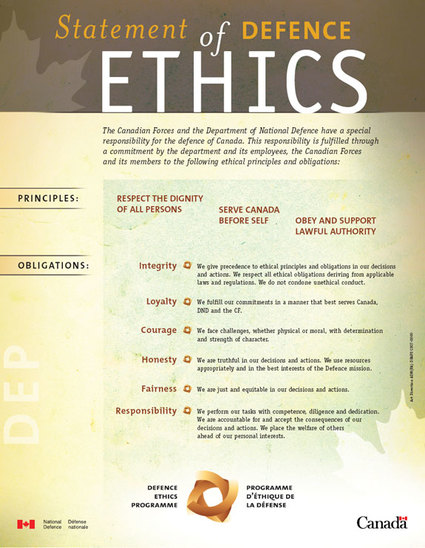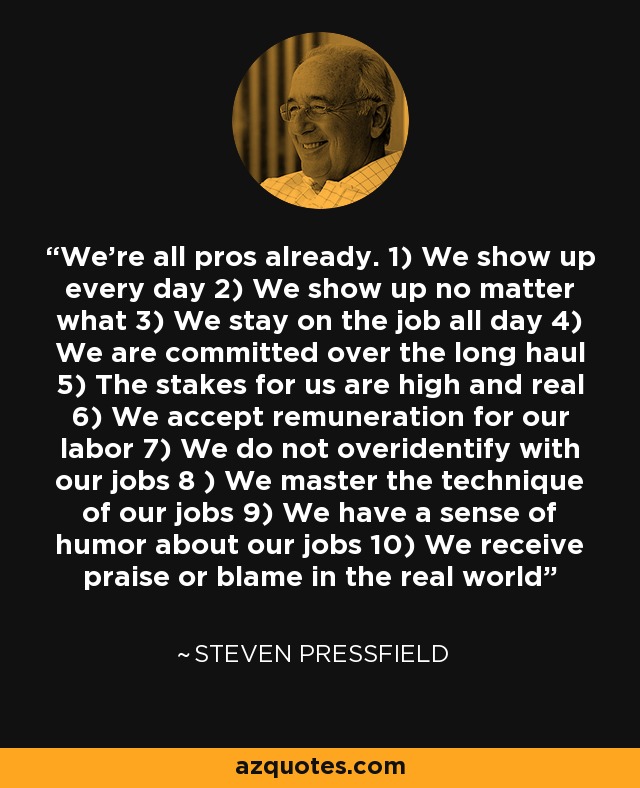There are many high standards in the military, which is a good thing. After all, entrusting an institution with the use of violence on behalf of society is an impressive responsibility. As necessary as these standards are, it can be difficult to meet them all the time. Over the course of my career, as ashamed as I am to admit it, I’ve periodically taken the easy way out.
On one night navigation exercise, with three legs left, untold kilometers to go, and only about ten minutes to do so, it seemed pretty obvious to me that I wasn’t going to make it. Instead of bashing through a dark swamp for the remaining time, I sat down, had a big dip of Skoal, then trudged back to the admin area. So what, right? It was only 10 minutes or so and it wasn’t a test, only a practice run.
Except it matters.
It matters because it didn’t embody the values of fighting spirit and the will to win, values that compose the ethos of the Canadian military. So while I’m virtually certain I wouldn’t have made the navigation points if I’d kept going, that’s not what matters.
What matters is that there’s a difference between giving up and failing. And in that particular situation, I chose poorly. Luckily, I got another chance, which led me to reflect on this week’s leadership principle.
This principle is kind of three distinct ideas woven into one, so it’s tempting to believe that in true military fashion this is really a catch-all tenet, or something that picks up the loose ends not covered in the other principles. At least it’s consistent though, as the predecessor principle appears to have been the previous catch-all, ‘Lead by Example,’ which pretty much covers everything. For all that, Lead by Example continues to be one of my favorite leadership principles of all time.
Diving into the component parts of current principle, upholding professional norms refers to living up to the standards of the profession, which has both behavioral and performance aspects, such as acting in a certain way or meeting qualifications. Maintaining order and discipline is, I think, broadly self-explanatory. Lastly, exemplifying the military ethos refers to embodying the spirit of a community, in this case, a military one.
These component parts can be applied to writing in a variety of ways. For example, standards of style and format apply to different types of professional writing. While what’s expected from a journalist is different from a copy writer, and different again from technical writing or creative fiction, there are some unifying themes, such as expressing ideas with clarity, in an organized manner, and with a high level of grammar and language. Yes, this could differ wildly between applications. Writing for a technical journal is far different than blogging, but the standards are applied regardless.
|
In the interest of time and space, I won’t discuss applicability of maintaining good order and discipline as I want to focus on the idea of ethos. According to Leading People, ethos is the, ‘essential character, identity, and guiding motivational spirit of an institution, desired by its members in pursuit of institutional goals.’ An ethos is particular to a certain set of conditions, based largely on the role of the institution – the ethos expresses the values, beliefs, and expectations that are believed to be necessary to accomplish the institutional mission. This is easy to see in some of the CAF’s expressed values, beliefs, and expectations about military service (which aren’t really all that different from comparison militaries). Unlimited liability, fighting spirit, courage, and teamwork; these all articulate beliefs consistent with an expectation of what it takes to succeed in the profession of arms. Then again, tracking causality is easy in this case as the role of the military in society is generally well accepted. |
What’s the role of the writer in society?
Unlike the military, does it even make sense to talk about writers as a group? E.B. White appears to have been against this idea. In The Duty of Writers, he suggested that the quality of writing didn’t do well when writers formed groups and instead, benefitted when writers held adversarial relationships. What’s more, he also questioned the possibility of a collaborative goal for writers in general except to write about whatever they want, or, “…it is the duty of writers to pay no attention to duty.’
In another essay, E.B. White expands on this idea by proposing the role of a writer as a custodian. More articulately, a writer is, ‘…charged with the safekeeping of all unexpected items of worldly or unworldly enchantment, as though I might be held personally responsible if even a small one were to be lost.”
Nicholas Conley expands on this idea by saying that writers are people who’ve accepted the responsibility to document the, ‘…time, place and character of whatever era they live in.’ This could manifest in different ways, and Conley suggests that different genres correspond to reflections of different facets of society at a particular time. So yes, even the authors writing cat mysteries (there is such a genre) are contributing to something much bigger than cats solving cold cases. the preservation of society. Pretty heady stuff.
So what ethos can be developed that helps a writer live up to this responsibility?
I think the most important thing here is to pick something. E.B. White suggested, ‘be good, not lousy; true, not false; lively, not dull; accurate not full of error.”
|
Or, seek inspiration in Steven Pressfield’s rules for professionals:
There are so many great resources here, again, I think the important thing is to pick something that you can live up to, which brings us to the last point. |
Align Your Actions With Your Ethos
This is what is meant by leading by example, picking an ethos to embody and then owning it from then on out. As heretical as it probably is for a writer to say this, but actions can sometimes speak louder than words and this is one of those times where showing is much more powerful than telling. Of course, the path will be difficult to hold to sometimes, but just keep coming back to it.
I remember my basic pilot training and being told to hold steady at a certain altitude and heading. I found it very difficult to hold the plane perfectly steady as conditions are always changing, but as long as I stayed on top of what was going on and made the appropriate course corrections, I was always able to bring it back. The same thing applies here.
Alternatively, being off the path might seem more like being in the literary equivalent of lost in a swamp, tired and soaking wet. Even then, every day starts afresh. So take a Marlboro Moment, reshoot the bearing, and keep trying. Better to fail attempting great things than attempt nothing and succeed.

